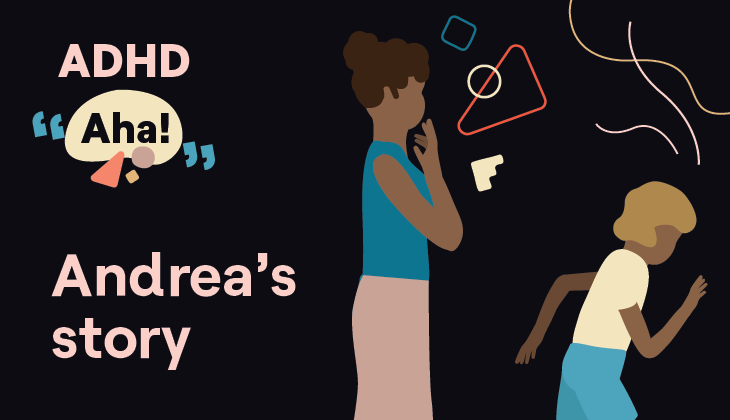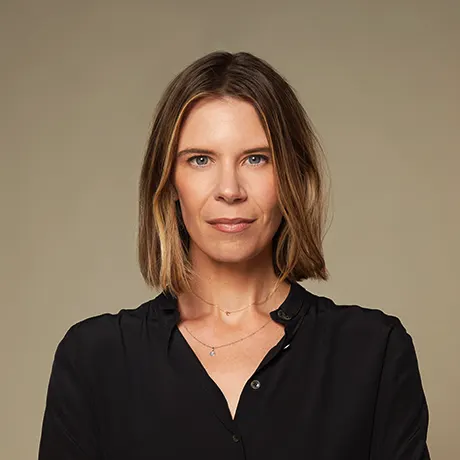Stay in the know
All our latest podcasts delivered right to your inbox.
Single mom Andrea Robinson was confused and overwhelmed by her daughter Tatiana’s “intense” and hyperactive behavior as a child. Tatiana — who’s now a thriving adult — got sent home from playdates, would tell lies, and couldn’t sit still. An extremely candid remark from one of Andrea’s friends changed all that — and it led to Tatiana’s ADHD diagnosis.
Hear about the moment that made Andrea say “OMG” on this episode of ADHD Aha!
Related resources
Episode transcript
Andrea: She was like, "I don't know, something's wrong with your daughter. Do you think she has ADHD?" And I was like, "Well, what is that?" So when I started researching, I just saw things like they have a hard time getting along with their peers. They like to be around adults more. They can't sit still. They want what they want.
All of them were symptoms that Tatiana was showing. And I was just like, OMG, that's my kid. I could now put a label on it and understand who she really was.
Laura: From the Understood Podcast Network, this is "ADHD Aha," a podcast where people share the moment when it finally clicked that they or someone they know has ADHD. My name is Laura Key. I'm the editorial director here at Understood. And as someone who's had my own ADHD "aha" moment, I'll be your host.
I'm here today with Andrea Robinson. Andrea lives in White Plains, New York. She's an HR director and a Zumba fitness instructor. And her daughter Tatiana has ADHD. Welcome Andrea.
Andrea: Hi. How are you, Laura?
Laura: I'm great. Thank you so much for being here with me today. So tell me about your daughter. Just want to hear you talk about her.
Andrea: So do you want to hear from the beginning, or do you want to hear current? Because we could be here for hours.
Laura: Why don't you start by telling me what it was like being Tatiana's mom before you knew she had ADHD.
Andrea: Wow. Well, you know, she is a very interesting person. She's very creative and sort of walks to her own beat. So she was always very different to begin with. And I just used to always wonder, like what was going on. But everybody's unique in their own way. So I kinda just went with the flow. But I really did have a tough time when she was younger, because she was kind of like all over the place. Wasn't able to focus on things for long.
And she was really impatient. Like everything had to go her way, you know. If not, she would throw a fit or give people a hard time. Just something as simple as "You're going to wear this tomorrow to school" would be like a big fight. I just didn't understand what was going on. And the hyperactive piece of it drove everybody crazy.
She was always so like really cute, really funny, just a great personality. So I think sometimes we overlooked all the other things that people felt was negative. She was precocious and just kept you on your toes, not in a bad way always, but a lot of the times in a bad way.
Laura: And you were a single parent, you said, right? How did you cope with it? Especially in those early years before you knew what was going on.
Andrea: A lot of crying. I cried a lot. I would try to drop her off for her dad's family a lot. And when I would be on my way home and they would be calling me, I wouldn't answer the phone. Because a couple of times when I did answer the phone, they were like, "Do you think you can come back? We're just having a tough time." But I would just say, "I have to go." You know, just dropping her off at other people's homes — my aunt, my cousins. I had a lot of support. So that was a good thing. Everybody doesn't have that. So I did get rid of her a lot, for right or wrong. Lot of crying.
And, I don't know, some days I was just like really down, cause I just didn't know what to do.
I felt like I was being punished. But you become a parent, you have to deal with those things. And so I dealt with them the best that I could.
Laura: Tell me about the moment that it clicked for you that she might have ADHD.
Andrea: So my girlfriend decided to take my daughter for the weekend just to give me a break, cause I was a bit overwhelmed with everything that was going on. And she was supposed to bring her back like late afternoon, early evening. And instead they came back in the morning. And I was disappointed because I didn't want to deal with her. And my friend just kept saying that, you know, "What's going on with her? Something's not right." Obviously I knew what was going on, but I didn't know that there was like a bigger problem. And girlfriend was like, "Does she have ADHD?"
And I was just like, "Well, what is that?" And she was like, "Well, you should do some research on it, because I think she has that." And that really was my "aha" moment, because there was like a label to this. There was something I could research. I could better understand what was going on. And once you understand a person, then you can work with them better.
Laura: How did you feel when your friend said that to you? Did you feel offended? Did you feel relieved? I mean, that's a strong statement for someone to say about a child — to say "What's wrong with her?"
Andrea: I think it's better than some of the other things that people had said. When she said it, I think I was taken aback. But I didn't know what ADHD was back then. So in a way I was like "Hmm, well, that's interesting. I can now do some research." Because I'm such a research type of person. And other people had said some negative things, but nobody actually said something like that. So I took it as a positive, even though I was taken aback. But I mean, if you don't address those issues and it just keeps on getting worse, and then you're even more confused.
Laura: A positive, because you felt like you were approaching a label and some answers.
Andrea: Yes. Then, you know how to deal with things, if you know what the issue is. And you know, people saying other things negative, like, oh, she's going to end up in jail or, oh, she's never going to graduate, or what's wrong with her or she's annoying or she's irritating. I mean, those are all negative things. But if you say to somebody, you know, "Does your kid have ADHD?" it's not like a total negative. It's sort of addressing the issue, asking a question to see if that is what she has. And I didn't even know anything about it. So I said, "I have no idea."
Laura: How did you go about getting answers from there?
Andrea: I look everything up. So I looked it up and, you know, everything I looked up, it was totally her. It was so weird. But I was just like, wow, this has got to be it. So then I took it a step further and I went to the school psychologist. And I just said to her, you know, "We've always had issues with Tatiana in school. And I'm having lots of issues with her at home — as you know." Cause some days I would show up to school and I would just start crying. It was just like very overwhelming. And I said, "Somebody mentioned this ADHD to me. What do you think about it?" And she said, "I was thinking she may have the same thing and I was going to ask you if you want it to get her tested." And I was like, "Wow, why didn't you tell me that before?"
I think she was just trying to take her time to see if she could figure things out because she was seeing the psychologist then. And she was saying little things about her. You know, that she was very manipulative, and for somebody who's young, you know, to be manipulative, you have to make sure that, you know, this is not going to go in the wrong direction. Right now it's cute, because she gets what she wants. But she's also young. But when she gets older, it may not be so cute. So, we did have her tested and it was ADHD.
Laura: Tell me about manipulative. Would she tell little white lies sometimes?
Andrea: Yes, all the time. So one day I took her to my job, and I worked at a law firm. And everybody used to say, "Oh, I can't wait till you bring her back. She's so cute." And you know, she could have conversations with adults better than she did with her peers. She never liked to be around her peers. And that was the other thing. And when she was around them, she was always bossing them around. So it was just really odd to see two kids the same age and one being like the leader, and the other the follower. And she was always the leader. And so I always had to monitor those playdates, so to speak.
But one day I took her to my job, and she was walking around, meeting everybody. And then I think I like probably went to my desk to do some work. And one of my girlfriends there took her and was like walking her around. She was talking to everybody. And the first thing I said, when I left her with this young lady was "Please don't give her any candy." And so she was like, "OK, no problem." The day ended, we go home, and she takes all this money out of her pocket. I go, "Where did you get that from?" And she goes, "Oh, the people at your job gave it to me." So I go, "Why would the people at my job give you money?" And she goes, "Well, you told them not to give me candy. So I asked them for money instead."
Laura: It sounds like there are a lot of things going on with that story. One being, it sounds like she was dealing with some impulsivity, which is something that's common in people with ADHD. And one thing we hear about a lot at our organization is we hear parents talk about kids with ADHD lying. And the fact is that a lot of times kids with ADHD, they will lie, but it's not malicious lying.
Andrea: Yes. I totally agree with that. And she was never, ever a liar, but she would say anything to get what she wanted. And that's manipulation.
Laura: Yeah. I mean, and a lot of times we'll hear about kids with ADHD telling lies because they know they did something wrong. They didn't follow directions. They were impulsive. These things that, you know, they know they're not supposed to be doing, but they have trouble controlling them because of the way their brain is. And so then to get out of it, they tell a lie.
Andrea: It was very much like that.
Laura: Did she have trouble sitting still?
Andrea: Yes, she was super hyper. So when she was in daycare, they were just very confused by her, but they liked her. They just couldn't figure her out. And so at daycare, I would often get calls and say, "Everybody else is sleeping. We need a break, and Tatiana won't go to sleep." And I go, "I know she doesn't sit still, and she doesn't sleep. I don't know what to tell you, but I have to go back to work now."
Laura: You have to work. We often associate hyperactivity with boys, and it's interesting to hear about hyperactivity in girls. And I appreciate your sharing that, because it helps us bust a myth that only boys are ever hyperactive, which we know is not true.
I want to talk more about your daughter growing up. She sounds like an intense kid.
Andrea: She is. I mean, she's not as intense now. She can be, but I think she's learned how to kind of make it work for her instead of against her. And we can say like one or two things when she's getting that way, and she just calms down quickly.
If you can't focus, if somebody brings it to your attention, then you sort of can work with it and start to focus a little bit more. But if no one says anything, you can just keep going and going.
Laura: And to be clear, like, I appreciate intensity. I was a very intense kid, especially cause I wasn't diagnosed. I didn't know what was going on. And I struggled a lot, and I often got called "overly sensitive" or "so intense" or "dramatic" growing up before I had any inkling of what was going on. I can relate to that.
Andrea: Yeah, she was the drama queen too. She was a drama queen. And everything was bigger than what it was. If she fell, she'd cry right away. She loved attention. She loved attention: negative, positive, it didn't matter. Everything really had to focus around her. It doesn't seem that bad when you're young and you're looking for attention. But when you get older, it's just not cute. Not at all.
Laura: Did her intensity get in the way of her ability to make and keep friends?
Andrea: Yes. So she had some friends that I think just liked being around her. And those were the ones that I would say liked somebody else controlling them, telling them what to do. They followed her, and they didn't mind that. So that worked fine. Now the ones that were a little bit more like her, they were not going for that. So, you know, they would fight often. I liked to have all the playdates at my house so I can manage them. Cause if she went to somebody else's house, the phone would just be ringing all day long. Tatiana is doing this, Tatiana's doing that. What's wrong with Tatiana. And I just couldn't deal with it. She just clashed with a lot of people that had strong personalities.
And I do, too. I have a strong personality. So we clashed all the time. And I remember one of her friends saying one day — she came home and she goes, "I think I need some help." And I go, "What do you mean?" And she goes, "One of my friends was like, you know, Tatiana, I really want to like you, but you make it very hard." And I understood that. I totally understood that, but she didn't understand that.
Laura: What did you say to her when you heard about this?
Andrea: I just said, "Whatever help you need, I will get it for you." And she was like, "Maybe I should see a therapist." And so I had to go to a therapist.
Laura: Wow. I think as women we're often expected to go with the flow. To, you know, carefully listen to everyone's experiences and to be that perfect friend.
Andrea: That was never her.
Laura: Yeah. I understand. A lot of girls with ADHD struggle with making and keeping friends. The social pressures on girls are tough.
Andrea: But she didn't care. If she lost a friend, she didn't care. If she called a friend when she was younger and said, "Oh, let's go to a movie." And the friend was like, "Oh no." And she would just say, "Fine, I'll go with my mom." And she would be fine.
Laura: Did she get along better with adults than the kids?
Andrea: Yes. Way better with adults. And that was the other piece I didn't understand, because a lot of my friends used to be like, "You need to let her go in the room with the kids instead of keeping her in the room with the adults." And I'm like, "I'm not keeping her. She chooses to be here." And she'd go in the room with the kids and come right back to the room with the adults.
I don't know if it was that she wasn't getting all the attention she wanted. And when she would be around the adults, everybody gave her attention because she was super cute, precocious. And the things that would come out of her mouth — people would say, "Is she really only 3 or 4? That's like crazy."
Laura: It sounds like she was a really sharp kid.
Andrea: Yeah. I mean, look, many kids that I know that have ADHD are super smart. So, it's like, how do you work with that then? You know, to get them to go in that positive direction and not a negative direction. Cause you can be super smart and end up doing bad things. So I think the big task was trying to channel all of that in a positive way and not in a negative way.
So it was a lot of work.
Laura: How did you start to channel that in a positive direction? Did that start to happen once she got tested?
Andrea: Yeah, I do recall one huge thing. The doctor said — because I used to always complain to the doctor, because we were always at the doctor's office. Something was always wrong. She was falling or this or that. So we were always at the doctor's office. And then she had asthma-related allergies. So she was always sick. So one day the doctor said to me — I think I went there and I just broke down in tears — and he was just like, "What's going on?" And it was always something different every day. So I just said to him, you know, in a nutshell, this is what's going on. And he said, "The best thing that you can do for yourself is when you come home from work, take her outside, whether it be a park or something, and just run her as much as you can. Sort of like a puppy." And I was just like, "But when I come home from work, I'm exhausted. I don't have time to go outside and play with her." And he said, "I'm just telling you, if you want to do yourself a favor, take her outside if you can. Every single day. And you'll see a better Tatiana." And he was so right, because she'd be so exhausted when she got home. Basically, all I had to do was like feed her, give her a bath, and she would go to sleep in seconds. And prior to that was not the case.
Laura: And she had a lot of energy.
Andrea: She had a lot of energy. And I have a lot of energy too. I do. I have a lot of energy too, and people say that now. That's why I'm a Zumba instructor. I like to get all that stuff out, you know, when you're having issues, things aren't going right. And to exercise for me is just like a lifesaver. And for her also. She started running track when she was very little and that also helped with the ADHD. She was running track I think when she was 5 or 6. I put her on a team and that was a godsend.
Laura: Wow. What was her event?
Andrea: So at first I think she was just running. The kids were just running, but she ran track for four years in high school, and she was a sprinter. So she was doing tennis and track, and it was definitely helping with the ADHD. For sure. Get all that extra energy out.
Laura: Are you or someone you know raising a child with ADHD? Check out Wunder, a free and safe community app from Understood, for parents and caregivers just like you. Wunder offers advice from experts in the field of learning and thinking differences, personalized content to guide you on your journey, resources and tools for everyday support, and a judgment-free environment built for you to feel understood.
Parenting a child with ADHD can be tough. Don't go through it alone. Search Wunder. That's Wunder with a U in the app store. Come find your group on Wunder. Check out what they're saying and join the conversation.
Laura: Watching Tatiana's behavior when she was growing up, what were you most worried about?
Andrea: I think so many, right? Because I think it starts, number one, with nervous that people just wouldn't like her, or, you know, maybe initially they would like her, but then after a while nobody wanted to be around her. I recall one time her grandfather, who adores her, him and his wife said, "Maybe don't bring her here as much until she gets a little older."
I think people just had a hard time dealing with hyperactiveness, the impulsiveness, all the attention she needed, you know. Couldn't sit still, you know. If they sent her outside, she'd be back in two seconds. It was just, she was all over the place. And I think people just couldn't deal with that. And I was afraid people wouldn't like her, or wouldn't want her around, you know. Like sometimes I would be going someplace and they'd be like, "Ooo, are you bringing Tatiana?
Maybe you should leave her home with your mom or something like that." That doesn't make me feel good, but I understood why they were saying it. Because I was going through it myself. And then the other thing was, I thought, what if she doesn't graduate? She couldn't even sit still in school. And so I was afraid she wasn't going to be successful.
Laura: And is she successful?
Andrea: She's very successful. She's actually moving next month to a job in Denver. And I'm just so proud of her, because it's a bigger job than what she's doing now. And I think it took her a little bit longer than the other people that started with her in that program. But at least she got there.
Laura: Which of her ADHD symptoms persist today? Even if they're more managed, what do you still see?
Andrea: She doesn't really focus well. Like she'll miss little things in her stories, and I'm like, "But how could you not have known that? You have it on the paper. And then when you transcribed it, then you left it out?" So it's little things like that. And that was how it was in school. It's just those small things that can affect you in a big way, but it doesn't seem that way initially.
Laura: She's a reporter, no?
Andrea: Yeah, she's a reporter. So it's mostly that kind of stuff.
Laura: How does she cope with that?
Andrea: She's hard on herself, which — I totally get that because I'm the same way. And I don't have ADHD. But she knows, like she has to like really pay attention to that kind of stuff for her profession, her career. And just try to re-read things and maybe go back and look at things, or do a little bit more research before she does the final product.
She's also — let's just say somebody's talking about something that she's really not interested in. She kind of tunes them out, which is sort of rude. And you could tell. I'm like, "Oh, are you paying attention?" She's like, "Oh, what did you say?" So she's not even listening. But that's how she is. If it's not something that she's interested in — or like at work, let's say that you're in a staff meeting. If it's getting boring, her mind is already gone someplace else. So that's a little bit hard for her. She's aware of it, right? But sometimes she just doesn't know she's doing it.
Laura: Well, the awareness of it is a first step to managing it.
Andrea: Yeah, of course. So she doesn't get upset when people say things. I think she gets more upset with herself, but it's still a struggle for her even now, because you are who you are, right? And if she's not interested in something, you know, I can be not interested in something and still look at you and listen to you. And I'm just like, "Oh, this is so boring" in my head. But she can't do that.
Laura: When you discovered that Tatiana had ADHD, did you share that with your family?
Andrea: I think I told everybody. It's nothing to be ashamed of. I know there are people that are ashamed of when they're labeled. And I know people that have ADHD that won't tell anybody. And I don't think she tells people that she has it. I don't think she does. I told almost everybody because I was like, "This is what's wrong." It's not something is really wrong with her. It's something that we can work on. If we didn't know what it was, how do you even work on it? So I was happy to be able to tell people. And when they were like, "Oh, that's why she does this.
Oh, that's why she's, oh, that all makes sense." I think people appreciated knowing.
Laura: Good on you. I mean, a lot of parents really worry about the stigma of ADHD, and understandably so. There are a lot of myths out there. There are a lot of misconceptions. But your openness to it and pushing for your daughter to get the supports that she needed, that's huge. It’s a life changer.
Andrea: And I'm pretty open anyway, like with most things. And I think that's why her and I are so, so close because I basically told her, tell her everything, even when she was young. And she tells me everything and she still does now as an adult. And people are often like, "Wow, you guys have such a good relationship." All her friends would say that, like, "How do you have that kind of relationship with your mom?" But I think it starts with being very open and honest and allowing them to come to you and tell you things where you're not going to reprimand them. You talk about it, you know.
Laura: It sounds like there was a very open community that she was raised in.
Andrea: Yeah. And look, everybody loved her. We just didn't understand her. I don't think there was one person that she met that didn't like her. They just didn't understand her.
Laura: What would you say to people who claim that ADHD isn't real?
Andrea: Wow. That's a really good question. I don't know how you could say it's not real. I mean, I have a kid that has it. I have friends that have it. I just don't know how you would say that it's not real. I live with it every day. My daughter clearly has it. And once we knew what it was, everybody basically was like, "It all makes sense."
Laura: Andrea, thank you so much for being here with me today. It's really been a pleasure. Tatiana sounds amazing and beautifully complex. And I love that about so many people with ADHD, and you just sound like you're such a great mom.
Andrea: Thank you. She's very unique and I love it to death. I wouldn't have it any other way.
Laura: You've been listening to "ADHD Aha," from the Understood Podcast Network. You can listen and subscribe to "ADHD Aha" on Apple, Spotify, or anywhere you get your podcasts. And if you like what you heard today, tell someone about the show. We rely on listeners like you to reach and support more people. And if you want to share your own "aha" moment, email us at ADHDAha@understood.org. I'd love to hear from you. You can go to u.org/ADHDAha to find details on each episode and related resources. That's the letter U, as in Understood, dot O R G, slash ADHD Aha.
Understood is a nonprofit and social impact organization. We have no affiliation with pharmaceutical companies. Learn more at understood.org/mission. "ADHD Aha" is produced by Jessamine Molli. Say hi, Jessamine.
Jessamine: Hi, everyone.
Laura: Justin D. Wright created our music. Seth Melnick and Briana Berry are our production directors. Scott Cocchiere is our creative director. And I'm your host, Laura Key, editorial director at Understood. Thanks so much for listening.
Host
Latest episodes
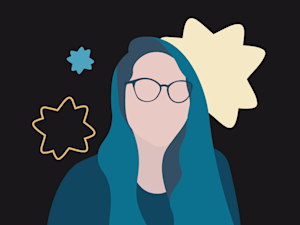
April 16, 2024
ADHD coach Jaye Lin was a gifted kid with undiagnosed ADHD. Now, she’s building communities and helping others cope with ADHD burnout.
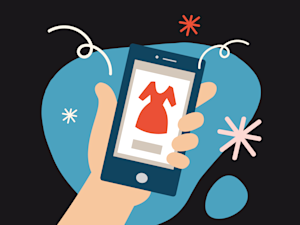
April 2, 2024
Writer Paulette Perhach had money coming in but struggled to keep it in her bank account. An ADHD diagnosis brought her struggles into perspective.
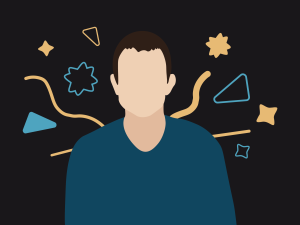
March 19, 2024
Eye to Eye founder David Flink is fighting the “just try harder” myth surrounding ADHD, dyslexia, and other learning and thinking differences.
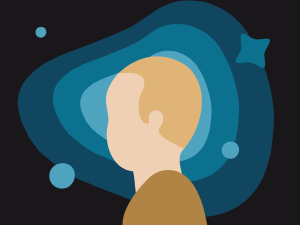
March 5, 2024
Peter Jones used to feel better saying he had a hearing problem rather than considering ADHD. Now, he knows he has ADHD and isn't afraid to say it.
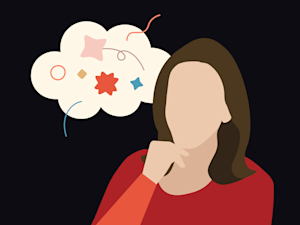
February 20, 2024
Before her ADHD diagnosis, ADHD coach Emily Weinberg thought she was just lazy. But in reality she was stuck in “analysis paralysis.”
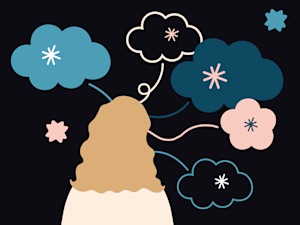
Carol Blumenstein was called an unteachable student. Now, she knows she has ADHD and dyslexia, and supports her five kids who learn differently, too.

January 23, 2024
Executive coach, actor, and former criminal defense attorney Ernest Anemone shares his ADHD story — and why he questions the term “attention deficit.”
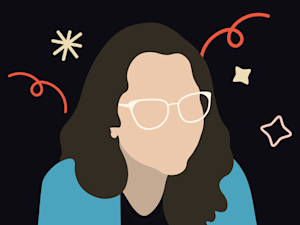
January 9, 2024
ADHD and post-traumatic stress disorder (PTSD) symptoms can look similar. And they can morph into what Hannah calls “a trauma ball of blame.”
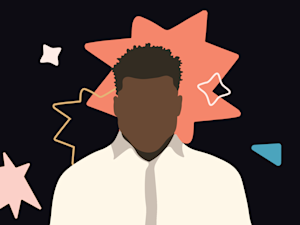
December 26, 2023
Livingston Steele was diagnosed with ADHD about a year into working at Understood.org. His experience and work have given him immense empathy for people with ADHD.
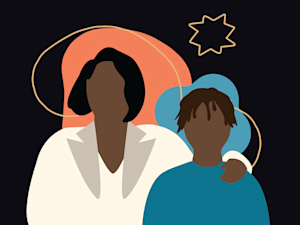
December 12, 2023
Wendy Zanders is a decluttering coach with ADHD. Find out how she got into organizing, and get a few tips for yourself.
